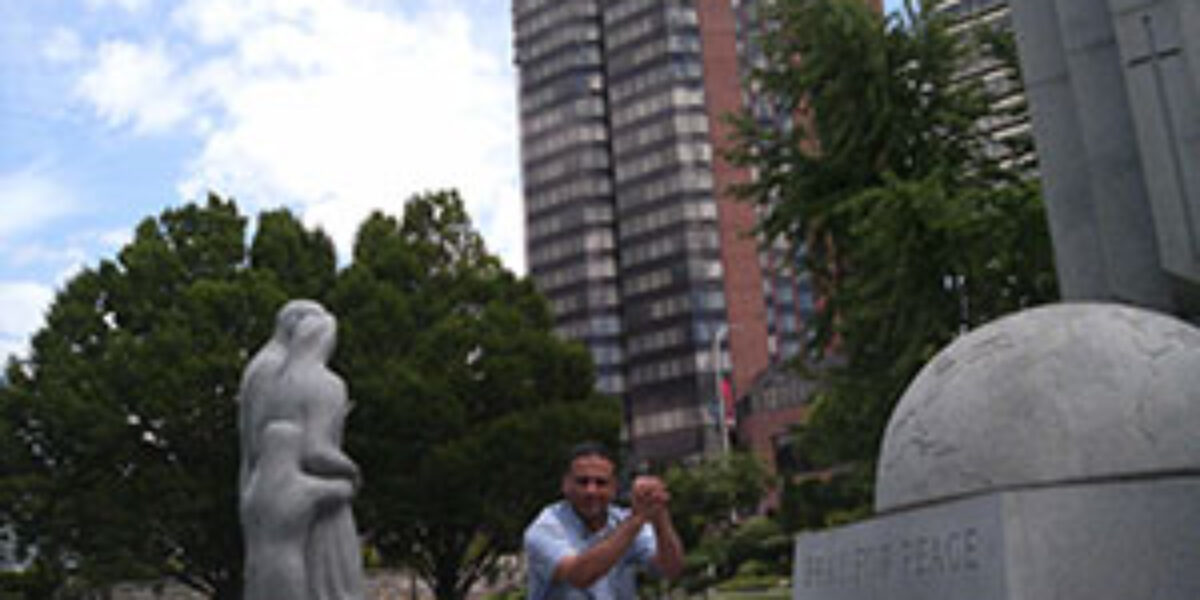WASHINGTON, D.C. (Mennonite Mission Network) – In Iraq, Osama Al-Salami was a nationally known professor at Sulaimani University, a respected periodontist with a private practice, husband to a successful lawyer and father of one son. But after living through the first Gulf War and the second American-led invasion of Iraq, Al-Salami left his home in Baghdad to seek education and asylum in Washington, D.C.
In the process, Al-Salami found a home with members of the Washington Mennonite community and earned a special place in many of their hearts.
His journey has been long, and wars in Iraq have cost him much.
Al-Salami has been kidnapped, detained and tortured multiple times. In 2005, he lost his wife, Asmaa, and his son, Ahmed, in an al-Qaeda bombing. Along with more than 100 Iraqi professors, he was kidnapped by the Iraqi police in November 2006 and later was captured by Shiite fundamentalists who mistook him to be a Sunni.
Last September, Al-Salami fled Iraq and gave a sworn testimony in Geneva, Switzerland, where he registered as an asylum-seeker. In December he came to the United States on a tourist visa, having been invited to speak at several periodontics conferences.
Brandt, a member of
First Mennonite Church in Hillsboro, Kan., serves as a protection counselor at UNHCR and works with walk-in clients. When they met, Brandt could tell that Al-Salami was upset. After hearing bits and pieces of Al-Salami’s story, Brandt set to work finding a place for him to stay that evening.
The shelters she called were not specialized for refugees.
“I didn’t feel comfortable with that because he was very vulnerable,” said Brandt.
After many calls and referrals yielded no result, a college friend referred Brandt to the
International Guest House in Washington D.C.
The International Guest House, sponsored by
Hyattsville (Md.) Mennonite Church and
Allegheny Mennonite Conference, is a welcoming place for international and U.S.-based visitors to Washington. When Brandt called house hosts Wilbur and Helen Yoder and shared Al-Salami’s story, they gladly opened their doors to him for the night.
“It sounds really simple, but knowing that he was going to a comfortable, caring environment was such a relief,” said Brandt.
Although the guest house is usually intended for short term stays only, Al-Salami was able to remain there through March 18. Through conversations, sharing meals with house guests, and informal interactions, Al-Salami became a trusted friend of many people who visited the guest house.
Slowly, Al-Salami has begun to share his story with those that he has come into contact with, although it is certainly difficult to re-live and re-tell. Local columnist and professor Colman McCarthy, director of the Center for Teaching Peace in Washington, invited Al-Salami to speak with several college classes.
Al-Salami has not achieved asylum status but is working with a pro bono attorney to win a student visa. Because of the psychological pressure of living in the United States, a country at war with his own, Al-Salami recently moved to Canada to continue his studies and work to gain asylum.
But Al-Salami has made connections within the Washington Mennonite community that will remain for many years to come.
“I greatly appreciate the Mennonite church. Really, it is in my heart deeply,” said Al-Salami. “The Mennonite church is a great peaceful church. Do not hesitate to contact me for every effort for peace, love and help to all.”
His story has left an indelible impact on Brandt and those he encountered at the International Guest House.
“Over his stay, Osama became more than a guest. He became a friend and someone we learned to know very well,” said Wilbur Yoder. “He taught us how far-reaching the horrors of this war are.”
Al-Salami is grateful for many people that he came in contact with during his stay in Washington, including Phyllis, Salome, Ernie and Mildred, long-term volunteers at the International Guest House; Joanne Kelsey at UNHCR; Dr. Kate Sugarman at Community of Hope in Washington; and Chris Nugent and Merrilyn Onisko, his lawyers. He is also thankful for the opportunity that authorities and people in Canada have given him to rebuild his life in a peaceful country after years of terror.
Mennonite Voluntary Service, one of Mission Network’s Christian Service programs, invites adults of all ages and backgrounds to spend a one or two year term living in community and serving in a variety of locations across the United States. For more information or to apply online visit Service.MennoniteMission.net.
For more information on Al-Salami’s story, read "One man’s tale of war," a column by Colman McCarthy printed in the National Catholic Reporter.







